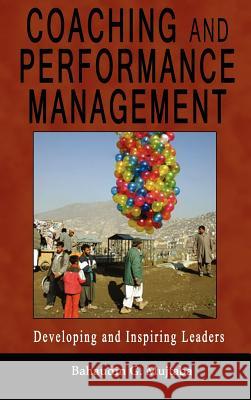Coaching and Performance Management: Developing and Inspiring Leaders » książka
Coaching and Performance Management: Developing and Inspiring Leaders
ISBN-13: 9780977421145 / Angielski / Twarda / 2007 / 388 str.
"Coaching and Performance Management: Developing and Inspiring Leaders" is about enhancing human capacity and development. In this book, coaching is focused on developing a trusting relationship with others, as well as on clarifying expectations and goals, thereby leading to specific action plans for their achievement. Coaching is not an innate skill, but rather it is learned. It occurs through one's life personally and professionally. Effective coaching is, and it can be, one of the most important functions managers perform because it communicates performance levels, expectations, importance of the tasks and responsibilities, and a caring attitude. The skills and behaviors of effective coaches are presented and thoroughly discussed. This book is appropriate for current and aspiring managers, leaders, scholars, and training and development professionals. This book defines coaching as the continuous process of conversational collaborations and interactions aimed at assisting others to unlock and realize their full potential one task and one skill at a time, and at a pace appropriate for the person being coached. The essence of coaching is unlocking people's potential, through rich, two-way interactions as well as stimulating questions, so people can maximize their own performance. Effective coaches accept the challenge of developing their colleagues and employees knowing that the growth and development journey is a continuous process, and that learning how to learn and develop are the real goals for both the coach and the coachee. The author has used the concepts discussed in this book both nationally and internationally with academic and practitioner audiences to help increase their awareness of performance management, coaching, influence, and leadership skills. As such, the concepts, cases, and exercises are relevant to today's work environment and can easily fit most leadership and management courses, seminars, and employee development workshops. Leadership and management trainers, corporate universities, colleges or professors wishing to adopt this book or any of its chapters may contact the publisher or the author for receiving the available supplementary facilitator's materials such as the electronic power point files for presentation, chapter summaries for usage with lectures and online postings, test questions for discussions or exams, and/or instructor thoughts or supplementary material for exercises. The instructor's resources comes electronically using Microsoft Power Point, Word, and other files; as such, they can be adjusted by each educator and facilitator for his or her lectures, training and presentations.











